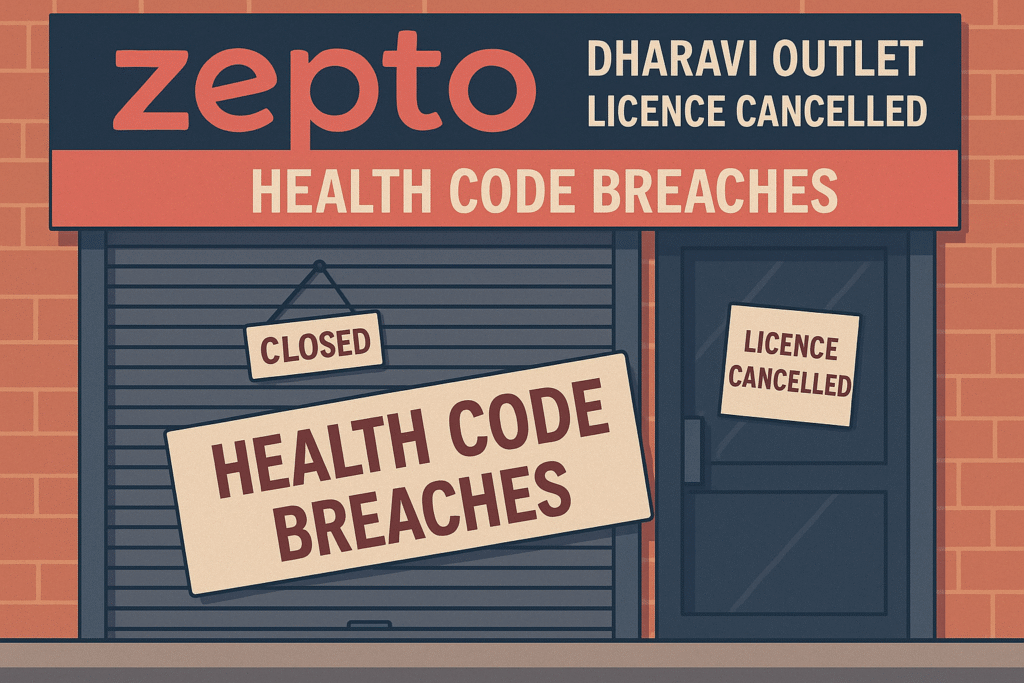Zepto’s Dharavi Licence Suspended Over Food Safety Violations: Fungal Growth, Expired Products Found
The Maharashtra Food and Drug Administration (FDA) has taken strict action against Zepto, the quick-commerce platform operated by Kiranakart Technologies Pvt. Ltd., suspending its food business licence for the Dharavi warehouse. The suspension followed a surprise inspection that uncovered severe violations of food safety norms.
Background of the Raid
The inspection was initiated based on information provided by Yogesh Kadam, Minister of State for Food and Drug Administration. Under the leadership of Joint Commissioner (Food) Mangesh Mane, the team was dispatched to the Dharavi facility. The on-ground inspection was conducted by Food Safety Officer Ram Bodke.
What they discovered has raised serious concerns about food handling and hygiene standards at one of Zepto’s busy locations.
Major Violations Found:
The inspection team noted multiple, alarming violations of the Food Safety and Standards Act, 2006, and its associated regulations:
- Fungal Growth on Food Items: Certain food products were visibly infested with fungal growth, making them unfit for human consumption.
- Presence of Expired Goods: Expired food items were found mixed with non-expired stock, without any clear segregation.
- Poor Hygiene and Storage Conditions:
- Food items were stored near clogged drains and stagnant water.
- The cold storage units did not maintain the required temperature levels.
- Many products were placed directly on wet, filthy floors.
- Improper Inventory Management: Lack of proper labeling and disorganized storage increased the risk of contamination and sale of expired or unsafe items.
Regulatory Action Taken
Following the damning inspection report, the FDA promptly issued a suspension order under Section 32(3) of the Food Safety and Standards Act, 2006. This order was signed by Assistant Commissioner (Food) Anupamaa Balasaheb Patil.
The suspension will remain in force until Zepto corrects all identified lapses and receives regulatory clearance to resume operations at the Dharavi facility.
Implications for Zepto
Zepto, one of the fastest-growing players in India’s quick-commerce space, now faces serious reputational and operational setbacks. The suspension affects its ability to deliver food products in the densely populated Dharavi region, a critical zone in Mumbai’s retail network.
The incident also draws attention to broader questions of food safety in the e-grocery and hyperlocal delivery sectors, especially given the speed at which these companies operate.
Zepto’s Official Response
In response to the action, Zepto issued a statement expressing regret and outlining steps being taken to address the concerns:
“At Zepto, maintaining the highest standards of food safety and hygiene is non-negotiable. We have already initiated an internal review and are working closely with the concerned authorities to ensure full and swift compliance. We are committed to rectifying the lapses identified, and strengthening our processes to provide the best and safest quality of products to our consumers. We are taking all necessary corrective measures to resume operations in accordance with regulatory obligations and applicable laws at the earliest,” said a Zepto spokesperson.
Corrective Measures Underway
According to company insiders and official sources, Zepto has begun implementing the following actions:
- Internal Audit: A comprehensive review of all storage and handling practices at the Dharavi location.
- Training of Staff: Refresher courses and hygiene protocols are being reintroduced for warehouse staff.
- Improved Inventory Systems: Ensuring better segregation of expired and non-expired goods, with tighter quality checks.
- Enhanced Infrastructure: Steps being taken to improve cold storage equipment and warehouse cleanliness.
- Frequent Inspections: Zepto may introduce regular third-party audits across its facilities to avoid future lapses.
Public and Industry Reactions
The development has sparked concern among regular customers who depend on Zepto for daily essentials. Health activists and food safety watchdogs have called for stricter enforcement of norms across all quick-commerce platforms.
Consumer advocacy groups emphasized that:
- “This is not an isolated issue. Many hyperlocal delivery firms compromise hygiene in the race to meet 10-minute delivery deadlines.”
- “The government must introduce mandatory random checks and publish results publicly to ensure transparency.”
Legal and Policy Implications
The case may have larger ramifications for the quick-commerce industry in India. With Zepto under scrutiny, other players like Blinkit, Swiggy Instamart, and BigBasket Now may also face enhanced inspections.
Moreover, the Food Safety and Standards Authority of India (FSSAI) may push for more stringent compliance guidelines in:
- Temperature-controlled logistics
- Digital inventory management
- Sanitary warehousing conditions
A Wake-Up Call for the Industry
The Zepto case highlights how rapid expansion and customer demand must not come at the cost of safety. In the rush to meet ultra-fast delivery promises, companies often overlook backend processes that are critical to public health.
This incident serves as a cautionary tale for:
- Startups to prioritize quality alongside speed
- Regulators to improve enforcement mechanisms
- Consumers to remain vigilant and report lapses
What’s Next for Zepto?
- Regulatory Hearings: The company will need to prove full rectification before the suspension can be lifted.
- Customer Communication: Zepto may initiate transparency campaigns or offer compensation to reassure affected users.
- Operational Changes: Expect stricter protocols across its entire logistics chain, not just in Dharavi.
Conclusion
The FDA’s action against Zepto’s Dharavi facility is a reminder that food safety can never be compromised—no matter how fast the service. For Zepto, the road to recovery lies in accountability, transparency, and swift corrective action.
Consumers, meanwhile, are advised to remain cautious and report any suspected issues with online food deliveries to authorities.
Stay updated with verified news, health alerts, and business regulations by following our newsroom.
